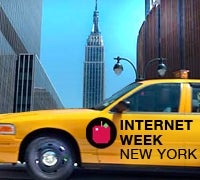 |
NEW YORK — In Sen. Barack Obama’s victory in the Democratic primary, which was all but formally confirmed with the final states’ contests on Tuesday, the evolving role of the Web presents a powerful lesson.
In the campaigns of Obama and opponent Sen. Hillary Rodham Clinton, one of the more pronounced contrasts was the relative inclusiveness of the two candidates’ messages — both offline and on — according to a panel of journalists discussing politics and the Web here at Time Warner’s headquarters for New York City’s Internet Week.
“If you look at the Democratic primary for the year and-a half that we’ve been doing it, his triumph is really a triumph of the ‘we’-centered campaign,” said Michael Scherer, Washington Bureau correspondent for Time magazine. “His message from the beginning was always, ‘We are in this together; we are going to do this together,’ and that was always connected immediately to the Internet.”
From the beginning, Scherer said that Obama’s Web site was set up to be something like a social networking environment, where people could make their own pages, express themselves and interact with each other as they do on Facebook or MySpace.
By contrast, Clinton’s site offered more of a traditional Web experience, where people’s interactions with the candidate were tightly controlled, and her candidacy suffered for it.
“The Hillary campaign for the first year I think was really behind the ball,” Scherer said.
According to Scherer, the superiority of the Obama campaign’s Web strategy was a principal reason why he raised $50 million more than Clinton did, including the $10 million of her own money she contributed to her campaign.
The panelists agreed that the participatory quality that the Web has taken in the four years since the last presidential contest has spilled into the political process. The Web 2.0 phenomenon is noteworthy in the political arena for how it has changed how people engage and interact with candidates, but even more so how people now interact with each other.
Look at this video
“The more important relationship online is not the relationship between the person online and the candidate, it’s the relationship between the person who’s online and their friends, talking about the candidate,” Scherer said.
He pointed to the popular “Yes We Can” pro-Obama video featuring Will.i.am of the Black Eyed Peas that became a viral hit on YouTube. “Because everyone was e-mailing their friends and telling them, ‘look at this video,’ it’s the networks between people.”
But the pluralistic nature of the medium can cut both ways for a candidate. Steve Grove, who heads the news and politics division at YouTube, recalled the famous “Macaca” moment from the 2006 midterm elections he called “the birth of what we call YouTube politics,” or “gotcha politics.”
George Allen, a Republican senator from Virginia, torpedoed his re-election campaign when at a campaign stop he spotted a staffer for his opponent who was filming the event, interrupted his speech and launched into an ill-advised string of verbal battery that included calling the young man of Indian descent “Macaca.” The clip circulated quickly on YouTube, Allen’s once-comfortable lead disappeared and he ultimately lost the election.)
To Grove, that moment was a wake-up call. Politicians of all stripes realized that the social networks and user-generated content sites were too important to ignore. “The candidates were forced to come there because that’s where the eyeballs were,” he said.
Page 2 of 2
In the last presidential election, Democratic candidate Howard Dean was widely credited for his efforts to mobilize the Web.
But the panelists said that the linchpin of Dean’s strategy was to reach out to the influential community of liberal bloggers, who then took up his advocacy. This online support helped Dean raise money.
“Obama rejected that early on,” Scherer said. “He never really pandered to the established liberal bloggers out there. “His idea of the Internet was [that] this is a tool that we’re going to get regular people to start using.”
The memorable YouTube debates
One of the most memorable examples of the Web lowering the entry barriers to the political dialogue in this campaign will certainly be the CNN/YouTube debates, where candidates responded to questions submitted by individuals through the video site.
Each party had a debate, but David Bohrman, senior vice president and Washington Bureau chief for CNN, said it was an easier sell on the Democrat side.
“It was difficult to pull the Republicans into a YouTube debate,” he said. “It took a lot of conversations.”
Apart from the debates, most of the candidates also met with YouTube for individual question-and-answer sessions. Grove said that in a private meeting, Obama declared that if he won the office, he would use YouTube to broadcast an ultramodern version of Franklin Roosevelt’s fireside chats.
Just as the Web is changing how advertisers and publishers control their brands and content, the panelists suggested that successful politicians will steadily move away from a top-down campaign message.
As Scherer pointed out, the victorious Obama framed his campaign rhetoric around “What we can accomplish together,” whereas Clinton’s message tended more toward “What I will do for you.”
That seems a tidy parallel to what the Web was and what it is becoming.


